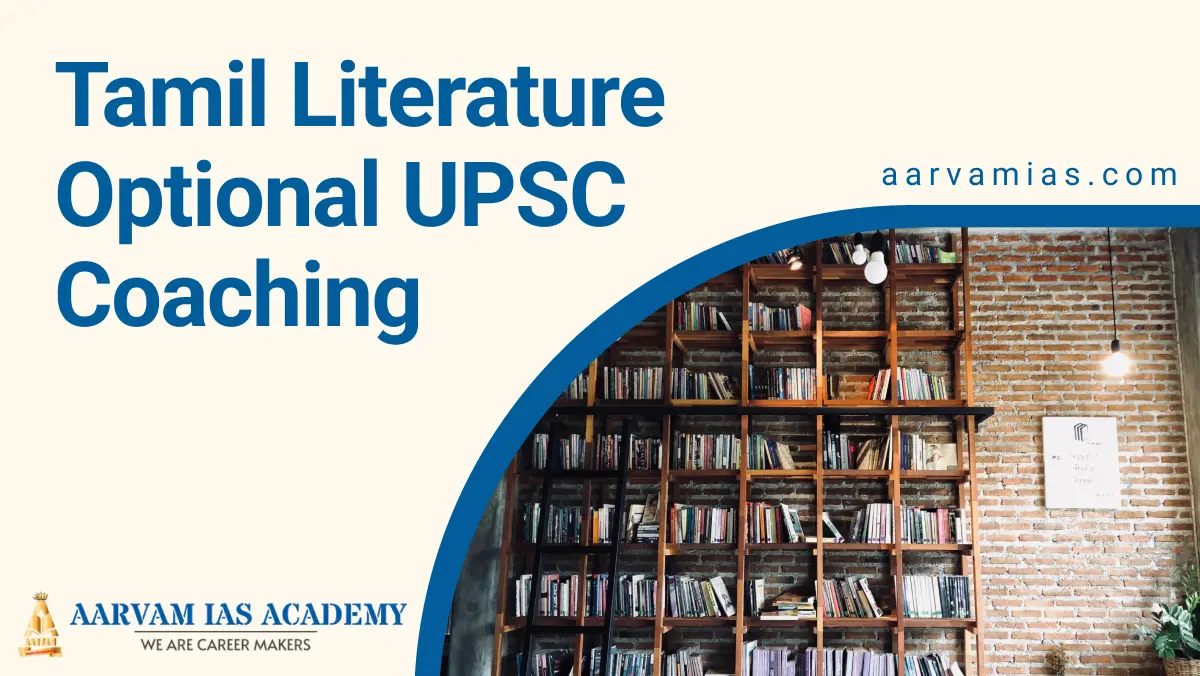
Tamil Literature, as an optional subject for the Union Public Service Commission (UPSC) examination, holds immense significance due to its rich cultural heritage, vast literary tradition, and its contribution to the overall understanding of Indian society. This blog aims to provide an overview of Tamil Literature Optional UPSC coaching highlighting its importance, benefits, and its value in the examination.
Importance of Tamil Literature Optional
The significance of Tamil Literature Optional includes the following:
- Preserving Cultural Heritage: Tamil Literature is a treasure trove of Tamil culture, traditions, and values. Choosing Tamil Literature as an optional subject helps preserve and promote the rich heritage of the Tamil community.
- Unique Perspective: Tamil Literature Optional UPSC coaching offers a distinctive perspective on Indian society. It presents a regional narrative that adds depth and diversity to the overall understanding of the cultural fabric of the country.
- Interdisciplinary Approach: Tamil Literature intertwines various disciplines such as history, sociology, anthropology, linguistics, and philosophy. It provides a holistic understanding of the society, politics, and culture of Tamil Nadu and the Tamil-speaking regions.
- Language Proficiency: Opting for Tamil Literature as an optional subject enhances language skills. Candidates develop proficiency in reading, comprehending, and analyzing Tamil texts. This linguistic competence not only facilitates the study of Tamil Literature but also equips candidates with effective communication skills, which are crucial for administrative roles.
Benefits of Choosing Tamil Literature Optional
There are various advantages of choosing Tamil Literature Optional UPSC coaching. It includes:
- Scoring Potential: Tamil Literature has a manageable syllabus compared to other optional subjects, allowing candidates to cover the entire content with depth and precision. As a result, scoring well becomes attainable with focused preparation.
- Limited Competition: The availability of Tamil Literature as an optional subject reduces the competition compared to popular choices, giving candidates an advantage in terms of scoring and ranking.
- Personal Interest and Motivation: Aspirants who have a background or genuine interest in Tamil language and culture find studying Tamil Literature more engaging and motivating. This personal connection can lead to better retention and understanding of the subject matter.
- Enriched Essay and Interview Preparation: Tamil Literature provides a unique perspective for essay writing and interview preparation, enabling candidates to showcase their knowledge and insights on diverse topics with a distinct flavor.
- Regional Representation: Choosing Tamil Literature Optional for UPSC contributes to the representation of regional languages and cultures in Civil Services examination. It promotes diversity and inclusivity, reflecting the pluralistic nature of Indian society.
Coaching Methods and Resources
- Coaching Institutes: There are specialized coaching institutes that offer guidance and coaching specifically for Tamil Literature optional. These institutes have experienced faculty members who provide comprehensive study materials, classroom lectures, doubt-clearing sessions, and mock tests.
- Online Platforms: Online platforms have become increasingly popular for UPSC coaching, including Tamil Literature optional. Dedicated websites, online courses, and video lectures provide comprehensive study material, interactive sessions, and doubt-solving forums.
- Study Materials and Books: Numerous publishers and authors have developed study materials, guidebooks, and reference texts specifically designed for Tamil Literature optional. These materials provided in the Tamil Literature Optional UPSC coaching cover the syllabus comprehensively and provide in-depth analysis, critical insights, and practice questions.
- Study Groups and Discussion Forums: Joining or forming study groups with fellow aspirants who have chosen Tamil Literature optional can be beneficial. These groups provide a platform for discussions, sharing of study materials, exchanging ideas, and clarifying doubts.
Self-Study and Preparation Tips
- Develop a Study Plan: Create a study plan that outlines the topics to be covered, study hours, and deadlines. A structured approach helps in systematic and organized preparation.
- Understand the Syllabus: Familiarize yourself with the syllabus and break it down into manageable portions. Prioritize areas that require more attention and allocate time accordingly.
- Read Widely: Read a diverse range of Tamil literary works to develop a comprehensive understanding of different genres, authors, and themes. This exposure enhances your knowledge and analytical abilities.
- Make Notes and Revise Regularly: Take concise notes while studying Tamil literary works. Regularly revise these notes provided during the Tamil Literature Optional UPSC coaching to reinforce your understanding and improve retention.
- Practice Answer Writing: Practice writing answers to previous years’ questions to develop the necessary writing skills and time management techniques. Seek feedback to improve your writing style and content.
- Mock Tests and Self-Assessment: Take mock tests to simulate the exam environment and assess your preparation. Analyze your performance and also identify weak areas, and work on improving them.
Conclusion
To conclude, by choosing the best coaching institute in Chennai like the Aarvam IAS Academy for Tamil Literature Optional UPSC coaching, aspirants can explore a world of literature, language, and insight that can enrich their overall learning experience and contribute to their success in the UPSC examination.
Syllabus









